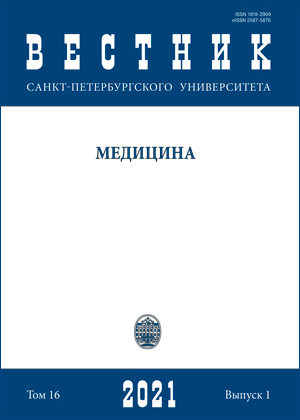Postoperative cognitive dysfunction in patients of the elderly and old age operated for composition of objective cancer
DOI:
https://doi.org/10.21638/spbu11.2021.104Аннотация
The problem of preserving the quality of life in the postoperative period, one of the criteria of which is the cognitive function, retains its relevance. In patients with advanced and senile age, after undergoing surgery, cognitive disorders are swept aside, which, according to various authors, reaches 64 %. Postoperative cognitive dysfunction was studied in 168 elderly and elderly patients operated on for complications of colon cancer. Patients were divided into two groups. Patients of the control group were operated on operations conventionally, the main one — laparoscopically, using endovideosurgical technologies. Cognitive status was assessed before the operation, as well as on the first, third and seventh days of the postoperative period
using the MMSE test (abbr. English Mini Mental State Examination). The incidence of postoperative cognitive dysfunction in both groups was traced. In the development of postoperative cognitive disorders, along with such factors as general anesthesia, age, aggravated neurological history, depressive disorders, operative trauma plays an important role. The use of endoscopic technologies allows reliably reducing the risk of postoperative cognitive impairment, which in turn has a beneficial effect on the postoperative period.
Ключевые слова:
colon cancer, cognitive dysfunction, surgical treatment, postoperative period, elderly and old age
Скачивания
Библиографические ссылки
References
Загрузки
Опубликован
Как цитировать
Выпуск
Раздел
Лицензия
Статьи журнала «Вестник Санкт-Петербургского университета. Медицина» находятся в открытом доступе и распространяются в соответствии с условиями Лицензионного Договора с Санкт-Петербургским государственным университетом, который бесплатно предоставляет авторам неограниченное распространение и самостоятельное архивирование.




